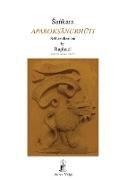Read more
Aparoksanubhuti belongs to the series of works by Sankara known as prakaräagrantha, i.e., "specific treaties" in verse and prose concerning basic points of Vedanta teaching that examine the "great sentences" (mahavakyas) contained in the Upanisads. In this series of treaties by Sankara, other works fundamental for the understanding of the Advaitavada or "path of Non-duality" include Vivekacudamani, ¿tmabodha, Upadesasahasri and Laghuvakyavrtti.
Aparoksanubhuti means "direct perception or knowledge of the Self" and by extension the action or practice actualized to realize oneself as ¿tman-Self, and therefore "Self-realization."
To achieve this Comprehension-realization, Aparoksanubhuti presents fifteen steps or means (some of which are also found in the Yogadarsana or Rajayoga of Patañjali) focusing especially on vicara-discrimination or discernment. Vicara is a method of philosophical inquiry, a process of pure searching for the universals, but, unlike what one may think, it is an "experimental" method. It is not a mental process for constructing a theory of knowledge or of reality; rather, it leads to the direct experience of Reality.
Because Aparoksanubhuti is based on jnana Realization (Knowledge), a text that appears as Sankara's Preface to the Svetasvatara Upanisad has been included in the Appendix because it promotes the right consciential position for one who wants to walk the "Path of Knowledge."
The translation and commentary by Raphael adhere to the Advaita Tradition and offer a conceptual methodology appropriate to the Western mind; moreover, they adequately and properly stimulate the reader's consciousness to living a real metaphysical life.
As for Sankara (788-820), it can be said that his philosophical and spiritual greatness is recognized by all scholars of Eastern and Western philosophy. According to some, he is "the architect of one of the highest realizations of the human Spirit."
The book includes a transliterated Sanskrit text and a Glossary.
About the author
SANKARA is regarded as one of the pre-eminent philosophical minds in the
history of India. He realized the most perfect synthesis and harmonization of
the entirety of Indian philosophical thought. His "method" for the research
of Truth, which consisted primarily in liberating it from the veils that cover
it, has given a contribution of great value to the metaphysical philosophical
thought of the entire world.
Sankara is considered from many perspectives a philosopher, a mystic, an
exegete of the Sruti, a founder of monastic orders (mathas), an Avatara
(Siva's incarnation). But above all, he is to be considered as the supreme
Instructor (Acarya) who was able to indicate the true and supreme end of
human existence, based on Knowledge, and which constitutes the very end of
the Upanisad: the recognition of our own real nature and liberation (moksa)
from samsara-becoming.

